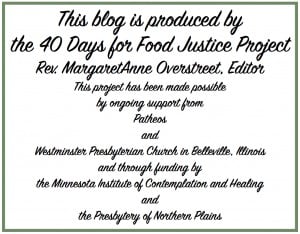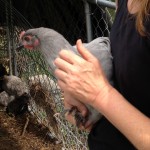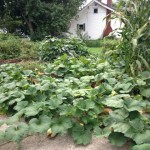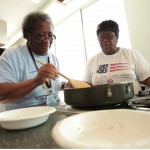Tracking our food back through the maze of the industrial food system to the farm from which it originated is an impossible task. Usually, we can track it back to its country of origin, but rarely to its farm of origin.
There are only two ways to know exactly where your food comes from: either to grow it yourself or to buy it directly from the farmer who grew it.
For some of us, either of those options are feasible.
For some of us, neither of those options is feasible!
On average, the items in your pantry, fridge and freezer have traveled 1500 miles, and have benefited from the use of a great deal of the resources of creation as they journeyed from the farm to the table.
The environmental implications of our industrial food system are wide-reaching and complex, but it doesn’t take an environmentalist to recognize that well-traveled produce is not a bonus.
But in addition to the significant pollution produced and the immoderate use of resources required to move food from place to place, we also end up depleting another all-too-scarce resource.
Water.
When we import food from warmer climates, we are also importing water … smuggled in the cells of food that is anywhere from half to two-thirds water. If the areas where this food is grown or raised are already short on water, we are actually exacerbating an already serious problem.
Read the stickers on your produce this week and see where it originated. Then do a little research. What are some of the justice implications of buying produce from that area?.
———————————-
Lenten Calendar for FEBRUARY 27
Read Wendell Berry’s essay, “The Pleasures of Eating”
————————————
Sign up to receive the daily meditations by email, or like us on Facebook.
We need your stories!
We’re already looking ahead to the 40 Days for Food Justice Project for 2016 and we’re looking for more stories, experiences, prayers and resources about food justice and food injustice.
If you would like to contribute – or would like to recommend a contributor – please send us an email and let us know.
About:
In addition to being the founder and editor-in-chief of the “40 Days for Food Justice Project”, the Rev. MargaretAnne Overstreet is a mom, a Presbyterian pastor, and a certified Health Coach. She does ministry with and among the good people of Westminster Presbyterian Church in Belleville, Illinois, where she gets her hands dirty in the community garden and, every Sunday, preaches with bare feet. She treasures family time, relishes every opportunity to teach and write about food justice, and loves to play outside with her dogs. Find out more about her at www.AnInBetweenPlace.com













